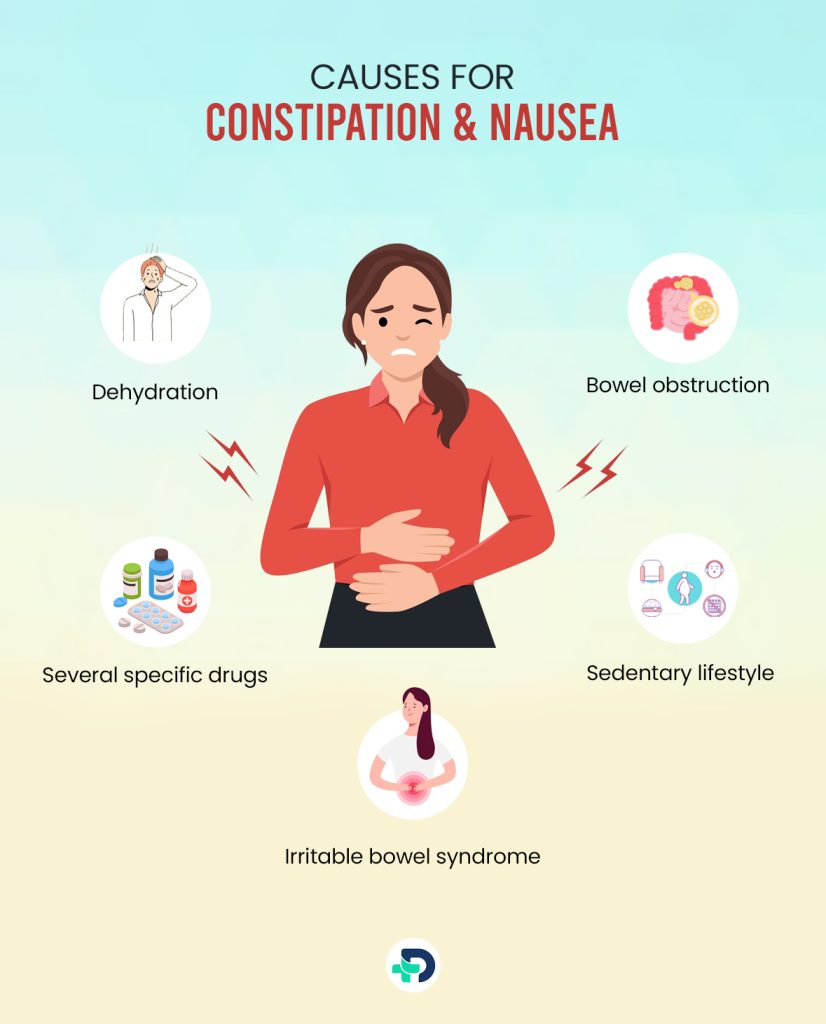Does Constipation Cause Nausea? Symptoms & Management

- Constipation
- 10 Oct 2023
Introduction
Constipation
Constipation is a pathological state characterized by a decrease in the regularity of defecation and/or the presence of challenges in initiating bowel movements. According to clinical criteria, constipation is typically characterized by a lack of bowel movements for a duration of three days or more. However, individuals who typically experience bowel movements two or three times per day may potentially be considered constipated if they fail to make a single bowel movement within a single day.

Symptoms
Symptoms of Constipation
Patients may develop constipation if they manifest one or more of the subsequent symptoms:
- Abdominal pain and bloating
- Nausea and/or vomiting
- Firm stools or difficulty in achieving defecation
- Small stools accompanied by a sensation of incomplete evacuation of the gastrointestinal tract
- Infrequent defecation
- Experiencing excessive exertion while defecating
- Rectal bleeding
Abdominal pain and bloating
- Individuals suffering from constipation may experience a sensation of abdominal tightness or a pronounced, colicky discomfort located in the lower gastrointestinal region. 2 Symptoms| Researched based study from International Foundation for Gastrointestinal Disorders
- Individuals may have a persistent sensation of satiety, akin to the feeling of having consumed a substantial meal, even in the absence of food intake for an extended period.
- Patients may also have symptoms of flatulence; however, it is important to note that the act of releasing gas does not provide relief from the associated discomfort.
Nausea and/or vomiting
- Although it may appear paradoxical, the presence of nausea and vomiting might serve as indicative symptoms of constipation.
- Although constipation primarily impacts the intestines rather than the stomach, its occurrence can impede the overall functioning of the digestive system, leading to a deceleration or obstruction of the passage of food from the stomach to the intestines.
- In such instances, individuals suffering from constipation may experience symptoms of nausea or even emesis.
- Diarrhea can also occur as a consequence of compromised overall digestive function due to partial obstructions in the stool passage. 2 Symptoms| Researched based study from International Foundation for Gastrointestinal Disorders
Firm stools or difficulty in achieving defecation
- Constipation is characterized by the desiccation and solidification of fecal matter, resulting in hindered defecation. Occasionally, individuals may encounter difficulty in ascertaining the consistency of their fecal matter.
- In order to enhance patient education regarding fecal matter, a hospital in the United Kingdom devised the Bristol Stool Chart, also known as the Bristol Stool Scale. This visual aid serves as a straightforward tool for evaluating the consistency of stools.
- The chart presents a visual representation of seven distinct categories of feces. When individuals seek medical advice with potential constipation, they may utilize a chart as a reference to describe their recent bowel movements. 4 Symptoms| Researched based study from National Institutes of Health
Small stools accompanied by a sensation of incomplete evacuation of the gastrointestinal tract
- The condition of constipation can result in individuals experiencing diminished bowel motions characterized by small size. 4 Symptoms| Researched based study from National Institutes of Health
- These diminutive defecations are frequently succeeded by recurrent and persistent impulses to defecate, although individuals experiencing constipation may discover that they are unable to generate subsequent bowel movements despite the persistent urges.
Infrequent defecation
- Individuals experiencing a decrease in the frequency of bowel movements, falling below their typical pattern, may be afflicted with constipation. The medical criterion for constipation is characterized by a frequency of less than three bowel movements per week.
- However, it is worth noting that certain individuals may have symptoms of constipation despite having a bowel movement frequency of five or six times per week. 4 Symptoms| Researched based study from National Institutes of Health
Experiencing excessive exertion while defecating
- Individuals experiencing constipation may need to exert significant effort and exertion throughout their lower extremities in order to facilitate the passage of fecal matter.
- Individuals may potentially experience discomfort in their abdominal muscles or perceive a sensation akin to participating in strenuous physical exertion during each instance of using the restroom. 4 Symptoms| Researched based study from National Institutes of Health
- Notwithstanding these arduous endeavors, patients may still experience difficulties in generating a bowel movement, or may only be able to do so with significant discomfort.
Rectal bleeding
- Rectal bleeding can occur as a result of the formation of anal fissures and/or hemorrhoids, which are often attributed to the passage of firm stools.
- The exertion involved in the passage of firm fecal matter might contribute to the formation of dilated veins in the rectal region, commonly referred to as hemorrhoids.
- Hemorrhoids may elicit sensations of pain, itchiness, or a combination of both. Extended durations of sitting can lead to discomfort or suffering, and potentially hinder regular bowel movements.
- Anal fissures refer to little lacerations occurring in the anus and the adjacent tissue, which may result in bleeding, a sensation of burning, and discomfort, particularly during defecation.
Relation
Why does Constipation Cause Nausea?
- When the colon experiences dysfunction, it disrupts the overall equilibrium of the gastrointestinal system. Consequently, the accumulation of fecal matter within the gastrointestinal tract induces sensations of discomfort or nausea in the abdominal region. 1 Relation| Researched based study from International Foundation for Gastrointestinal Disorders
- The delayed transit of food through the colon results in the accumulation of toxins within the body. It is the presence of these poisons that elicits the sensation of nausea.
- Moreover, the condition of constipation can result in abdominal distention and bloating, a consequence of the prolonged retention of fecal matter within the colon. This phenomenon elicits a proliferation of microorganisms within the colon, hence inducing a sensation of nausea.
- The presence of constipation can lead to a decrease in appetite and subsequent meal avoidance, with the extent of these effects being dependent on the severity of the condition.
Causes

Causes for Constipation & Nausea
Occasionally, the presence of constipation and nausea may indicate the manifestation of a medical ailment. Frequently seen ailments encompass:
Dehydration
- The occurrence of dry, firm feces might be attributed to insufficient hydration within the body and the intestines.
- Insufficient hydration can impede the movement of food or waste throughout the gastrointestinal tract.
- Dehydration has the potential to decelerate gastrointestinal motility, leading to the manifestation of symptoms such as nausea, bloating, and excessive gas production.
Bowel obstruction
- Bowel or intestinal obstruction refers to the occurrence of a hindrance within the colon that impedes the normal flow of stool.
- Additional manifestations of an intestinal obstruction are abdominal discomfort, emesis, and distension of the abdominal region.
- The presence of inflammation within the intestines due to Crohn’s disease has the potential to induce obstruction, in addition to the occurrence of infections such as diverticulitis.
- The occurrence of a blockage can also arise in the presence of a hernia or the formation of adhesions within the colon. Bowel or colon cancer is an additional etiological factor leading to the occurrence of blockages.
- Irritable bowel syndrome (IBS) is a gastrointestinal disorder that exerts its impact on the big intestines. A range of symptoms can be induced, such as constipation and nausea.
Several specific drugs
Several drugs have the potential to induce gastrointestinal adverse effects, such as constipation and nausea. These encompass:
- Narcotic analgesics, such as codeine and oxycodone
- Antihistamines to treat allergies and allergic reactions.
- Diuretics that promote diuresis, which is the increased
- Antidepressants are a class of medications commonly prescribed to treat depressive disorders.
Sedentary lifestyle
- The etiology of chronic constipation is not only attributed to an underlying medical condition. The issue may perhaps stem from a deficiency in physical activity.
- Regular physical activity facilitates the promotion of regular muscular contractions throughout the intestines. This facilitates the smooth passage of fecal matter through the gastrointestinal tract.
Home Remedies
Home Remedies for Constipation
Constipation can typically be managed with self-care measures implemented at home, which commonly involve the following strategies.
Modify your dietary and beverage choices
- It is advisable to increase the consumption of foods that are rich in dietary fiber.
- It is advisable to consume ample amounts of water and other fluids when incorporating a higher intake of dietary fiber or utilizing a fiber supplement. 3 Home Remedies| Researched based study from National Institutes of Health
- Familiarize yourself with dietary recommendations for alleviating constipation by exploring appropriate food and beverage choices.
- The recommended daily fiber intake for individuals varies based on age and gender, ranging from 22 to 34 grams.
Implementing a bowel training regimen
- The medical practitioner may recommend establishing a consistent daily schedule for bowel movements as a means to improve regularity.
- One potential strategy to facilitate bowel movements is to aim for a time window of 15 to 45 minutes following breakfast, as the act of eating has been observed to stimulate colonic motility, hence aiding in the passage of stool.
- It is advisable to allocate an adequate amount of time for defecation and promptly utilize restroom facilities upon experiencing the urge to evacuate one’s bowels. 3 Home Remedies| Researched based study from National Institutes of Health
- In order to enhance one’s comfort, it is advisable to engage in muscular relaxation techniques or elevate one’s feet by utilizing a footstool.
Cease the consumption of specific medications or nutritional supplements
- If an individual suspects that specific medications or dietary supplements may be contributing to their constipation, it is advisable to consult with a healthcare professional.
- The healthcare provider may opt to modify the dosage or provide an alternative medication that does not elicit constipation as a side effect. It is imperative to consult with a healthcare practitioner before altering or discontinuing any medication or supplement.
Utilize non-prescription medications
A healthcare provider will provide you with information regarding the most suitable laxative for your needs. 3 Home Remedies| Researched based study from National Institutes of Health
- Fiber supplements
- Osmotic agents
- Stool softeners
- Lubricants
- Stimulant laxatives
Stimulant usage should be limited to cases of severe constipation or when alternative treatments have proven ineffective.
If an individual has been regularly using laxatives for an extended period and has become dependent on them for bowel movements, it is advisable to consult a medical professional regarding strategies for gradually discontinuing their use. Ceasing the use of laxatives will eventually result in the restoration of regular bowel movements in the colon.
The physician may recommend the temporary utilization of a laxative. The healthcare professional will provide guidance regarding the most suitable laxative for your specific needs.
Treatment
Treatment for Constipation
In the event that self-care interventions prove ineffective, a medical professional may opt to administer medication as a means of addressing constipation.
Pharmaceutical drugs that require a prescription
- The physician has the option to prescribe any of the subsequent medications for the treatment of constipation. 4 Treatment| Researched based study from National Institutes of Health
- Drugs to augment fluid levels within the gastrointestinal tract. This therapeutic intervention has been shown to alleviate abdominal discomfort, promote fecal softening, and enhance bowel movement frequency.
- Pharmaceutical agents that aid in the establishment of regular bowel motions for those afflicted with irritable bowel syndrome accompanied by constipation or chronic constipation of idiopathic origin.
- Drugs that are designed to facilitate colonic motility in individuals experiencing chronic idiopathic constipation, whereas the underlying etiology remains undetermined.
Biofeedback treatment
- Biofeedback treatment is a therapeutic approach that involves the use of electronic devices to measure and provide individuals with real-time information. 4 Treatment| Researched based study from National Institutes of Health
- In the event of experiencing difficulties with the musculature responsible for regulating bowel motions, a medical professional may suggest the utilization of biofeedback therapy as a means of reconditioning said musculature.
- The utilization of biofeedback therapy enables individuals to modify their muscular functioning.
Surgery
- When alternative therapies are ineffective, surgical intervention may be advised by a medical professional to address an anorectal obstruction resulting from rectal prolapse.
- In cases where the proper functioning of the colon muscles is compromised, surgical intervention may be recommended by medical professionals to remove the colon. 4 Treatment| Researched based study from National Institutes of Health
- It is advisable to inquire about the potential advantages and drawbacks associated with the procedure.
Takeaway
Constipation & Nausea – Consult a Healthcare Practitioner
If lifestyle modifications prove insufficient in maintaining regular bowel movements, it is advisable to consult a healthcare professional who can assist in excluding alternative medical conditions and devising a potentially more efficacious treatment regimen. If an individual experiences frequent episode of constipation and nausea, it is advisable to consult a healthcare practitioner for guidance and assistance. If an individual experiences constipation and nausea alongside additional severe symptoms such as fever, substantial abdominal discomfort, or the presence of bloody stools, it is imperative to promptly seek medical attention at an emergency department. Once the individual or their healthcare provider is able to resume their efforts, it is advisable to implement modifications to their dietary and lifestyle habits in order to enhance regularity.
Any feedback on this article?
 This Articles content was accurate
This Articles content was accurate Very Informative Article
Very Informative Article I have a question or a comment
I have a question or a comment
 This article contains inaccurate content
This article contains inaccurate content This article was not helpful
This article was not helpful I have a question or a comment
I have a question or a comment
We appreciate your helpful feedback!
Checkout our social pages
References
-
International Foundation for Gastrointestinal Disorders
Relation
-
International Foundation for Gastrointestinal Disorders
Symptoms
-
National Institutes of Health
Home Remedies
-
National Institutes of Health
Symptoms | Treatment





































